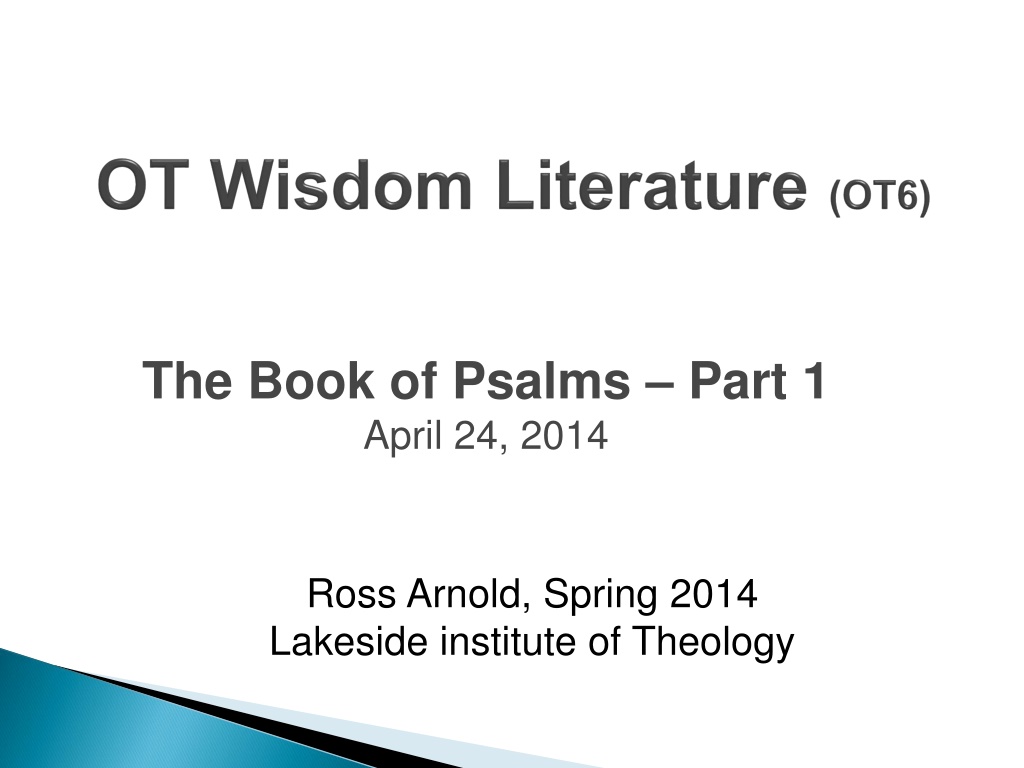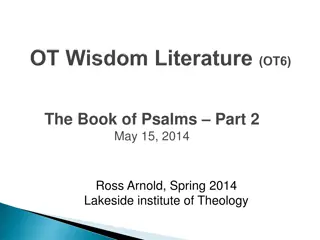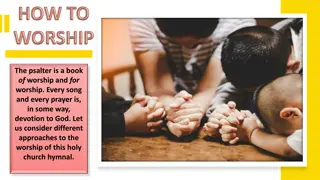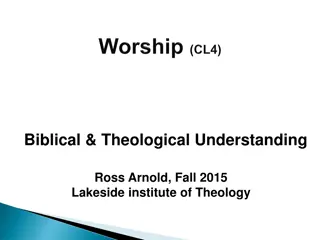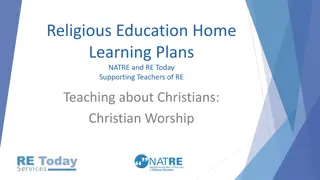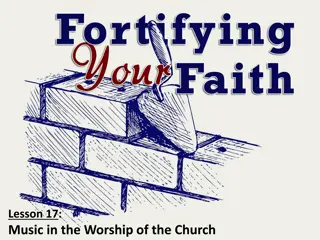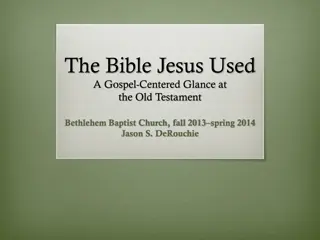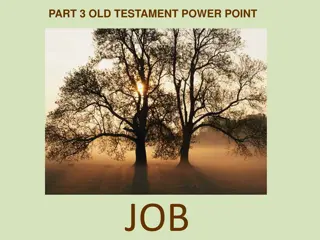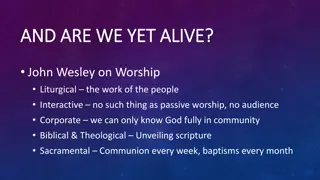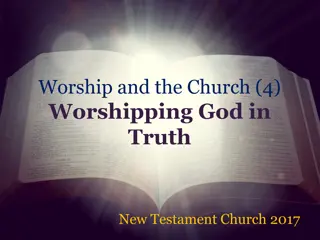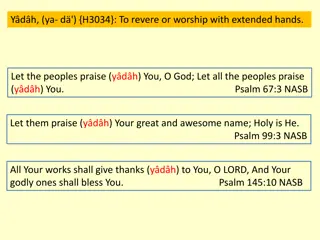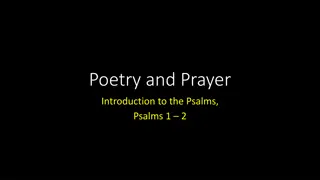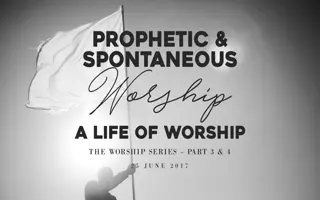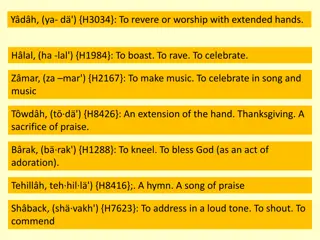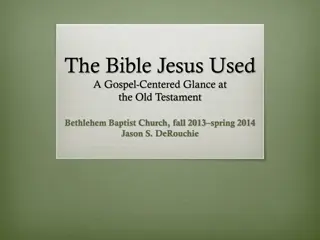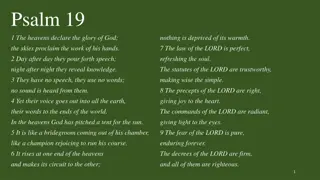The Book of Psalms: A Journey of Worship and Reflection
The Book of Psalms, attributed to various authors including King David and Moses, is a collection of prayers, poems, and hymns that reflect diverse themes such as worship, wisdom, and the coming of the Messiah. It serves as a timeless guide for renewal in worship, reflection on self-awareness, and a realistic response to suffering in the world.
Download Presentation

Please find below an Image/Link to download the presentation.
The content on the website is provided AS IS for your information and personal use only. It may not be sold, licensed, or shared on other websites without obtaining consent from the author. Download presentation by click this link. If you encounter any issues during the download, it is possible that the publisher has removed the file from their server.
E N D
Presentation Transcript
The Book of Psalms Part 1 April 24, 2014 Ross Arnold, Spring 2014 Lakeside institute of Theology
OT Wisdom Literature (OT6) Apr 3 Introduction to Wisdom Literature Apr 10 The Book of Job Apr 17 No Class (Holy Week) Apr 24 The Book of Psalms, Part 1 May 1 No Class May 8 No Class May 15 The Book of Psalms, Part 2 May 22 The Book of Proverbs May 29 The Book of Ecclesiastes June 5 The Song of Songs; Final Exam
Law/History 5+12 Wisdom 5 Prophets 5+12 39 27 66 3
Most Scripture speaks to us, while the Psalms speak for us. Athanasius If the rest of Scripture may be called the speech of the Spirit of God to man, this book (the Psalms) is the answer of the Spirit of God in man. Alexander Maclaren The Psalms open up to us familiar access to God. John Calvin The Psalms are like manna which taste to every man like that he loves best. John Donne 4
1. For renewal in worship and prayer. 2. For renewal in self-awareness. 3. To show the absolute mercy of God which finds fulfillment in the coming of Jesus. 4. To reflect a realistic response to the suffering in the world. 5. To reflect the community of God s people, worshipping, praying, witnessing and working together.
Title: The Hebrew name for the book is Tehillim, or Praises. The Greek translation, psalmoi, means instrumental music. Author: Seventy-three of the Psalms have superscriptions identifying King David as their author. Two (Ps. 72 & 127) are attributed to Solomon; Ps. 90 identifies Moses as its author; twelve Psalms (50, and 73-83) are ascribed to the family of Asaph; eleven Psalms (42, 44-49, 84-85, 87-88) are credited to the Sons of Korah; Ps. 88 is attributed to Heman; and Ps. 89 is assigned to Ethan the Ezrahite. Fifty Psalms do not identify their authors. Date of Writing: If Moses did write Psalm 90 it would be the earliest, around 1450 BC; while Psalm 137 was apparently written during the Babylonian Captivity, around 586-538 BC. They were probably brought together into their present form shortly after the Captivity around 537 BC. 6
Recipients: The ancient Jewish people, and everyone since. Themes: The Book of Psalms is the longest book in the Bible, with 150 chapters or individual psalms. It is also one of the most diverse, dealing with subjects such as God and his creation, war, worship, wisdom, sin and evil, judgment, justice, and the coming of the Messiah. Content: The Book of Psalms is a collection of prayers, poems and hymns that served as the worship hymnal from ancient Israel, leading worshipers into praise and adoration of God. Structure: The Book of Psalms is a divided into Five Sections, each closing with a doxology: Book 1 Psalm 1-41 Book 2 Psalm 42-72 Book 3 Psalm 73-89 Book 4 Psalm 90-106 Book 5 Psalm 7
Types of Psalms: The simplest view of the Psalms identifies TWO forms Psalms of Praise; and Psalms of Lament. But others have proposed the following Psalm forms: 1. Hymns songs of praise for God and his work in creation. 2. Communal Laments in which the nation laments some common disaster. 3. Royal Psalms dealing with the king and events in his life. 4. Individual Laments lamenting events in the life of an individual. 5. Individual Thanksgiving Psalms in which an individual gives thanks for blessings. 6. Wisdom Psalms similar to Proverbs. 7. Psalms of Remembrance recollecting past events, especially God s great work on behalf of the Israelites. 8. Judgment Psalms visiting curses on enemies. 8
The Hallel The Psalms of Praise Psalms 113-118 (Sung at Feasts of Passover, Weeks & Tabernacles)
The Song of Ascents The Psalms sung by pilgrims going up to Jerusalem Psalms 120-134
